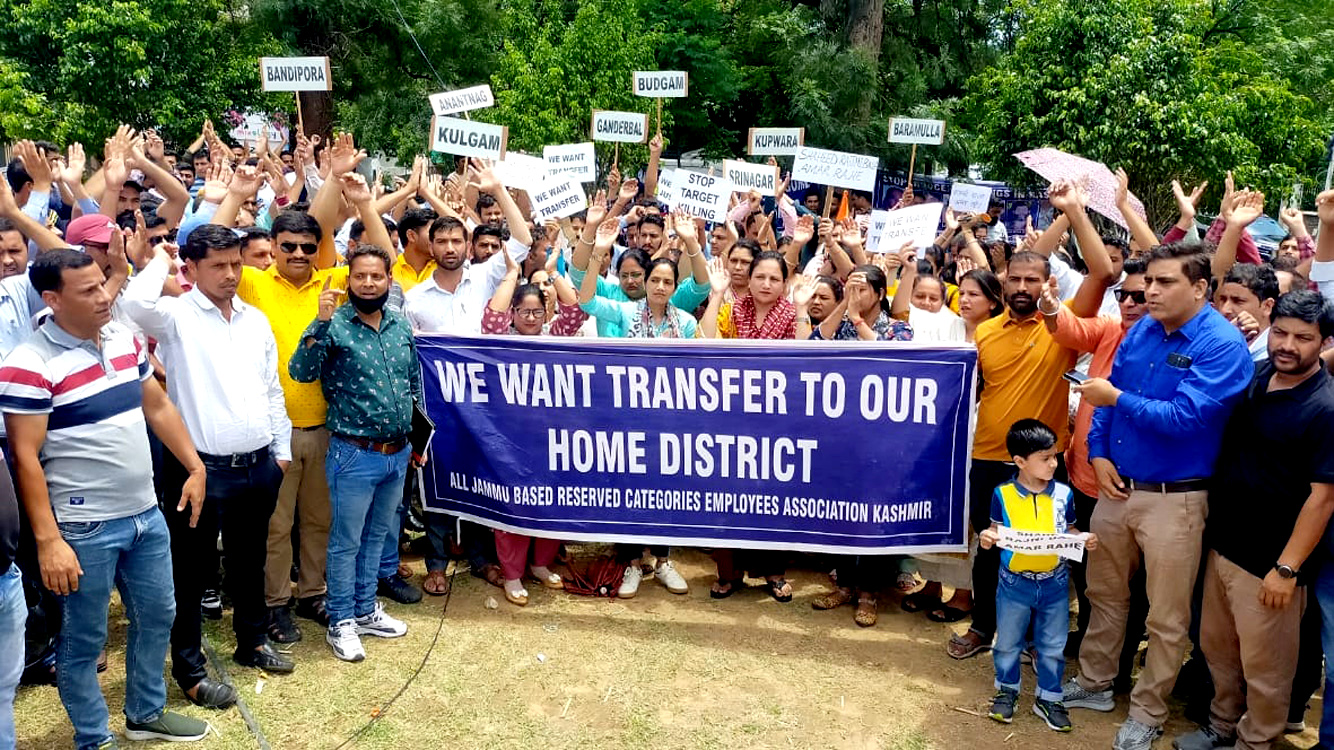
The government faces a tricky situation because if it gives in to the demand, it would defeat the very purpose of giving Kashmiri Pandits an employment in the valley, which was meant to incentivize their return to their homeland, writes Riaz Wani
It is for many months now that Kashmiri Pandit employees posted in Kashmir Valley are demanding their transfer to Jammu following the killings of a few of them by the militants. But the administration has refused to budge and insisted that the employees who have fled to Jammu should rejoin their duties. The matters came to a head recently when the Lieutenant Governor Manoj Sinha asked the protesting employees to return to Kashmir, failing which their salaries will not be disbursed.
Talking to the media persons in Jammu, the LG said that almost all migrant Kashmiri Pandits have been posted at various district headquarters and there may be some whose issues are being resolved.
“We have a nodal officer who is monitoring the grievances of migrant Kashmiri Pandits. All measures are being taken to resolve their issues,” Sinha said. “But one can’t sit at home and enjoy the salary and other perks.”
He, however, said that some targeted killings of Pandits took place after which the community raised some concerns. “The administration took swift action and resolved the issues confronting the Kashmiri Pandit employees working under PMRP (Prime Minister’s Rehabilitation Package),” the LG said.
Pandits are up in arms ever since the militants shot dead Rahul Bhat— a Kashmiri Pandit employee posted at the Revenue Department office in Budgam district – in May. Subsequently, the Resistance Front (TRF), said to be a shadow organisation of the proscribed Lashkar-e-Taiba (LeT), threatened the valley’s Hindus to leave the region.
The TRF released a list of Kashmiri Pandits saying that non-locals and Kashmiri Hindus were taking away their jobs and land in Kashmir. In fact, the list of Kashmiri Hindus TRF planned to target was the same one that the government had employed under a prime minister’s package.
This has been a cause of concern for security agencies. The disclosure of names is being seen as a big breach of security as questions are being raised as to how the TRF got access to this confidential document.
There are around 4,000 Pandit employees recruited under a special package and all of them are seeking posting away from the Valley. Similarly, nearly 8,000 employees from different districts of the Jammu division are working in Kashmir under an inter-district transfer policy and a predominant majority of them are non-Muslims.
Twenty four people have been killed in Kashmir over the last year, the victims include migrant labourers and security personnel returning for holidays to their homes.
Pandit employees are demanding that the government waive off the bond requiring them to remain permanently posted in Kashmir. The government’s quandary is that if it gave in to their demand, it would defeat the very purpose of the Pandits’ employment in Kashmir, and which is to somehow incentivize the return of Pandits to their homeland.
This is, thus, a very tricky situation and the government is doing a tightrope walk to ensure both of its ends are served: killings and threats stop altogether and Pandits also don’t leave, and go to their duties.
Hence, the warning from LG Sinha to Pandit employees to return to their duties. But this has further riled Kashmiri Pandits who see returning to the Valley and attending duties as risking their lives. Union Minister Jitendra Singh has, however, come to the rescue of Pandits. Taking a direct dig at the LG Sinha, Singh said that he personally believed that nothing is more important than a life.
“I would say that if there is a threat to even one life, even a dozen offices could be shut,” Dr Jitendra Singh told the media in Jammu.
But this has brought the Kashmiri Pandit issue nowhere close to resolution. Meanwhile, Pandits continue to protest in Jammu seeking their transfer from the Valley.













